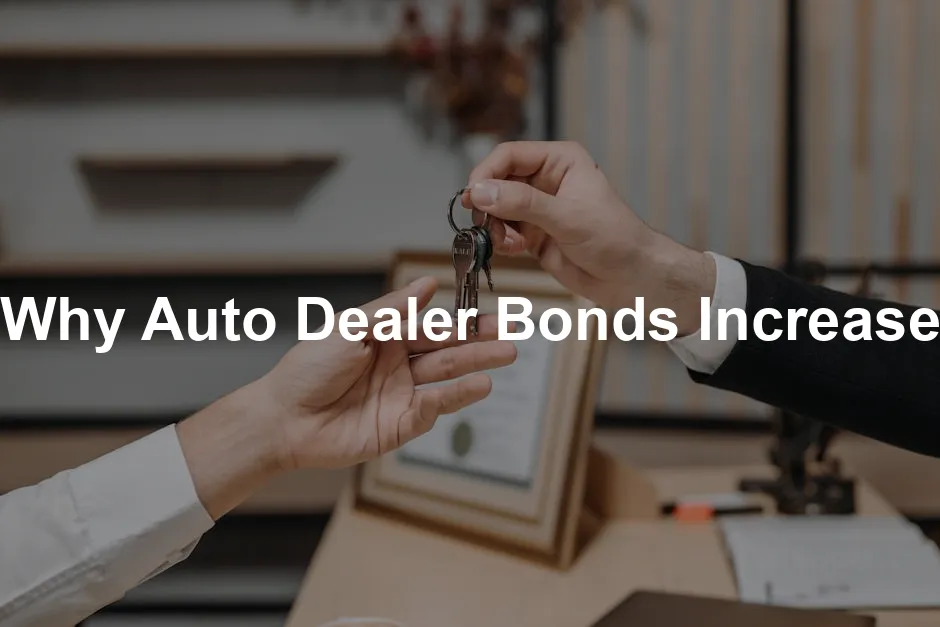
Why Auto Dealer Bonds Increase
Introduction
Auto dealer bonds are essential in the automotive industry. They ensure dealerships operate legally and ethically. Understanding the factors that cause these bonds to rise in cost is crucial for dealers. This article aims to explore the various reasons behind the increasing costs of auto dealer bonds.
Speaking of essentials, if you’re running a dealership, you might want to check out the Automotive Compliance Manual to keep your dealership on the right side of the law. Trust me, nothing says “I’m a responsible dealer” like a comprehensive guide to compliance!
Summary and Overview
Auto dealer bonds protect consumers and promote ethical business practices. They are a form of surety bond that guarantees compliance with state laws. If a dealer fails to meet their obligations, the bond compensates affected parties.
Several factors contribute to the rising costs of these bonds. These include changes in regulations, increased fraud, and economic conditions. Higher bond costs impact both dealers and consumers. Dealers may face financial strain while consumers could experience reduced options and higher vehicle prices.

If you’re looking to ease some of that financial strain, consider investing in Car Dealership Management Software. It’s like having a personal assistant that keeps your dealership organized and efficient—without the coffee spills!
Understanding Auto Dealer Bonds
What is an Auto Dealer Bond?
An auto dealer bond, also known as a motor vehicle dealer bond, is a legal agreement that protects the public from fraudulent actions by dealers. It involves three parties: the dealer (principal), the surety (insurance provider), and the obligee (the state or regulatory body that requires the bond). If a dealership violates state laws or fails to fulfill contractual obligations, the surety pays claims up to the bond’s limit. The dealer must then reimburse the surety for any payouts.
These bonds reassure consumers that dealerships will adhere to regulations and ethical practices. They are a fundamental requirement for obtaining a dealership license in most states, reflecting the dealer’s commitment to responsible business conduct.
The Purpose of Auto Dealer Bonds
Auto dealer bonds serve several purposes. Firstly, they protect consumers against fraud and unethical practices. If a dealer engages in misconduct, affected buyers can file claims against the bond for compensation.
Secondly, these bonds ensure compliance with state laws and regulations. They help maintain market integrity by holding dealers accountable for their actions.
Lastly, having a bond enhances the credibility of the dealership. It builds trust with customers, demonstrating that the dealer values ethical practices and customer protection. In essence, auto dealer bonds are crucial for fostering a fair and trustworthy automotive marketplace.

Speaking of credibility, have you checked out the Customer Service Training Manual? It’s a fantastic resource for ensuring your staff knows how to treat customers right—because happy customers are repeat customers!
Factors Influencing the Increase in Auto Dealer Bonds
1. Changes in State Regulations
State regulations play a significant role in determining bond requirements. As laws evolve, many states have increased the required bond amounts. For instance, New York recently raised its bond requirement for used car dealers. Dealers selling up to 50 vehicles now need a $20,000 bond, while those selling more than 50 require a $100,000 bond. Such changes can substantially elevate costs for auto dealers. Regulations are often updated to enhance consumer protection or curb fraud. As states respond to market conditions, dealers must adapt to these new financial responsibilities.

To navigate these changes effectively, consider using a Business Credit Score Improvement Guide. This guide can help you understand how your credit score affects your bond costs, giving you the tools to make informed decisions.
2. Increased Fraud and Consumer Protection
The auto industry has seen a notable rise in fraud cases, prompting higher bond amounts. In recent years, cases of misrepresentation and unethical practices have increased, leading regulators to act. Higher bond amounts provide better protection for consumers. For example, a larger bond means that customers can receive greater compensation if fraud occurs. This adjustment not only safeguards the public but also holds dealers accountable. With rising vehicle prices, ensuring adequate coverage becomes even more critical. As a result, dealerships must prepare for these increased financial obligations.

Don’t forget to equip your dealership with the right tools! Check out the Vehicle Diagnostic Scanner. This nifty device can help you quickly identify issues with vehicles, which can save you time and money in repairs—no more guesswork!
3. Economic Factors
Broader economic conditions also influence bond costs. Inflation, for instance, affects the purchasing power of consumers and can lead to higher bond premiums. As inflation rises, the cost of doing business increases, prompting surety companies to adjust bond rates. For example, a recent report indicated a steady inflation rate increase, leading to adjustments in various industries, including auto dealerships. Economic stability is vital for maintaining reasonable bond costs. When the market fluctuates, dealers may feel the impact through rising expenses, including bond premiums.

To combat these fluctuations, consider investing in a Financial Management for Dealerships book. This resource will help you understand how to manage your finances better during economic downturns.
4. Dealership Performance and Claim History
A dealership’s claim history significantly impacts bond costs. Higher claims can indicate a lack of compliance with regulations, which raises the perceived risk for surety companies. If a dealer has a history of frequent claims, they may face increased premiums. This relationship between claims and costs emphasizes the importance of maintaining a clean record. Dealers must prioritize ethical practices to minimize claims. By doing so, they can potentially lower their bond costs while demonstrating their commitment to responsible business conduct.
To help maintain that clean record, consider using a Fraud Prevention Handbook for Businesses. This handbook can help you identify potential risks and mitigate them before they turn into claims!
5. Credit Score Impact
Your credit score plays a crucial role in determining auto dealer bond costs. Both personal and business credit scores are assessed by surety companies. A higher credit score typically leads to lower premiums. Conversely, a drop in credit scores can increase bond costs significantly.
To improve your credit score, start by paying bills on time. Reducing debt and keeping credit card balances low also helps. Regularly check your credit report for errors and dispute inaccuracies. Consider diversifying your credit mix, like adding an installment loan. These steps can enhance your creditworthiness and ultimately reduce your bond expenses.

And hey, while you’re at it, you might want to check out a Credit Repair Kit. After all, a little boost to your credit score can go a long way in saving you money!
6. Financial Health of the Dealership
The financial stability of your dealership is vital for securing favorable bond rates. Surety companies evaluate your financial health before issuing a bond. Healthy cash flow, consistent revenue, and manageable debt levels can lead to lower premiums.
To maintain strong financial health, regularly review your financial statements. Implement effective cash flow management practices. Cut unnecessary expenses and ensure timely payments to suppliers. Building a solid financial profile not only helps in bond costs but also boosts overall business credibility.

If you’re looking to stay organized, consider investing in a Automotive Tools Organizer. Keeping your tools in order helps maintain efficiency and professionalism in your dealership!
7. Changes in Business Structure or Ownership
When a dealership undergoes changes in ownership or structure, bond premiums can be affected. Surety companies view these changes as increased risk, which may lead to higher costs. For example, a new owner may lack the proven track record that insurers value.
To manage these transitions smoothly, maintain clear communication with your surety provider. Ensure all required documentation is complete and up-to-date. Consider consulting with a bonding expert during the transition. This proactive approach can help mitigate potential increases in bond premiums.

8. Market Trends and Competition
Shifts in market trends and competition among dealerships can significantly impact bond requirements. As the automotive industry evolves, surety companies adjust their risk assessments. Increased competition might lead to lower bond costs, while a surge in fraud cases could raise them.
Dealers need to stay informed about market conditions. Understanding how these trends affect bond costs can help you make better financial decisions. For consumers, these changes may translate to variations in vehicle prices and available dealership options.

And while you’re staying informed, don’t miss the latest insights in the Automotive News Magazine. It’s like a newspaper for car enthusiasts and industry professionals alike!
Strategies to Manage and Reduce Bond Costs
1. Improve Credit Health
Enhancing your credit score is vital for lowering bond costs. Start by paying bills promptly and reducing existing debt. Consider obtaining a credit report to identify and correct any inaccuracies. Maintaining a low credit utilization ratio also helps. You might want to diversify your credit mix by adding installment loans. Over time, these steps can significantly boost your creditworthiness. A higher credit score not only decreases your bond premiums but also strengthens your overall financial position. Remember, a little effort can lead to substantial savings on bond costs.

2. Maintain a Clean Claim Record
Minimizing claims against your bond is essential for keeping premiums low. Adopt best practices to handle customer complaints swiftly and effectively. Document all transactions thoroughly, which can help prevent misunderstandings. Train staff on compliance and customer service to avoid potential disputes. If issues arise, address them immediately to prevent escalation into claims. Regularly review your claims history and work closely with your surety provider to resolve any misunderstandings. A clean claim record not only saves money but also builds a solid reputation for your dealership.
If you’re looking to improve your service, consider a Car Detail Supplies kit! A clean vehicle not only attracts buyers but also shows that you care about the quality of your dealership.
3. Stay Informed on Regulatory Changes
Keeping up with industry regulations is crucial for managing bond costs. Failure to comply can lead to penalties, higher bond premiums, or even loss of your license. Regularly check updates from your state’s motor vehicle department to stay informed. Attend industry seminars and engage with professional organizations to gain insights into compliance. By understanding regulatory shifts, you can proactively adapt your business practices. This not only avoids unnecessary costs but also positions your dealership as a responsible market player. Knowledge is power, especially in the fast-changing automotive landscape.

4. Consult with Surety Bond Specialists
Seeking advice from surety bond specialists can help you navigate complex bond management. These professionals understand the nuances of bond requirements and can offer tailored solutions. They can guide you on improving your bond costs based on your specific situation. Additionally, they can help you compare different surety companies to find the best rates. A good specialist will also keep you updated on regulatory changes that may impact your bond. Leveraging their expertise can lead to significant savings and ensure compliance while you focus on running your dealership.
FAQs
What is the purpose of an auto dealer bond?
Auto dealer bonds protect consumers from fraudulent actions. They ensure that dealers comply with state regulations, providing a financial safety net for buyers in case of misconduct.
How do state regulations affect auto dealer bond costs?
Regulatory changes can lead to increased bond requirements. As states update their laws, bond amounts may rise, impacting overall costs for dealers.
What can a dealership do to lower their bond costs?
Dealerships can improve their credit scores, maintain a clean claim record, and stay informed about regulatory changes to help lower their bond expenses.
Are there specific requirements for obtaining an auto dealer bond?
Common requirements include a completed bond application, proof of business registration, and a credit score report. Requirements may vary by state.
How does a dealer’s credit score influence bond premiums?
A higher credit score usually results in lower bond premiums. Poor credit can lead to increased costs, as it signifies higher risk to surety companies.
Can changes in dealership ownership affect bond costs?
Yes, changes in ownership can increase bond premiums. New ownership may be seen as a higher risk, prompting surety companies to raise costs to cover potential liabilities.
Please let us know what you think about our content by leaving a comment down below!
Thank you for reading till here 🙂
Understanding the reasons behind bond costs is essential for dealers. why auto dealer bonds increase
All images from Pexels




